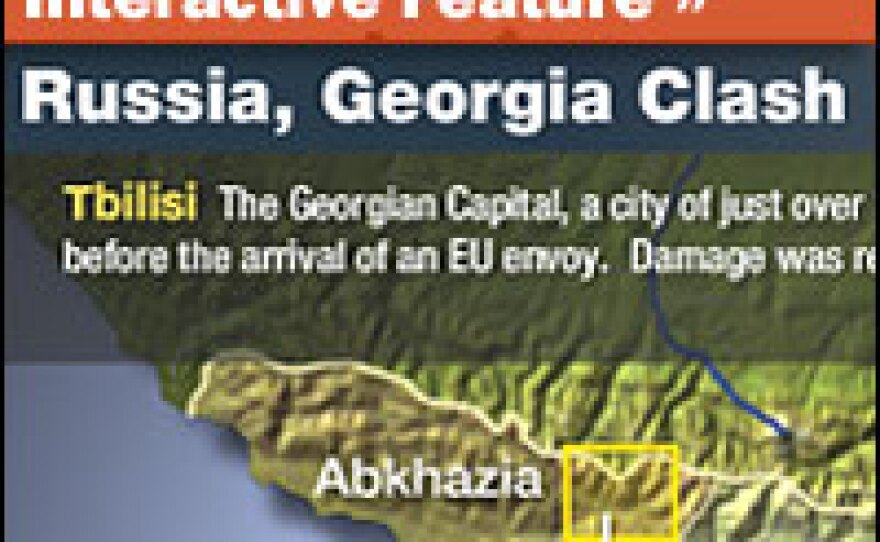
The frustration among NATO nations at Russia's military action in Georgia was almost palpable Tuesday during an emergency meeting of foreign ministers from the alliance's 26 nations.
U.S. Secretary of State Condoleezza Rice initiated the meeting, and it was meant to formulate a sharp response to Russia's invasion and partial occupation of Georgia.
NATO nations are unified in viewing Russia's actions as unacceptable, a violation of international law and norms, and a challenge to the alliance itself. NATO members are further displeased that Russia signed an agreement to withdraw from Georgia that it has all but ignored.
But translating frustration into action — action that could challenge or reverse Moscow's invasion — has been almost impossible.
On Tuesday, NATO decided to suspend — for the time being — formal diplomatic contacts with Russia through what is known as the NATO-Russia Council.
"There can be no business as usual with Russia under present circumstances," said Jaap de Hoop Scheffer, NATO secretary general. "And the future of our relations will depend on the concrete actions Russia will take to honor the words of [Russian] President Medvedev to abide by the six-point peace plan — which is not happening at the moment — he signed together with the president of Georgia."
A Mild Statement
The alliance released a statement encapsulating its views on Russia and Georgia. But the language fails to capture the heat of how some in NATO have said they feel about Russia right now.
Remarks from Rice have been fairly sharp but she, too, has had trouble explaining what actions NATO could take that would have some bite. She said this meeting will send a strong signal to Russia.
"The United States sought precisely what we got in this statement, which is, most importantly, support for Georgia's democracy," Rice said. "Secondly, a very strong message that the Russian president ought to keep his word; and third, a very clear statement of principle from this alliance that a new line in Europe where Russia somehow asserts that there are those who cannot opt for a transatlantic future is unacceptable."
Support for Georgian democracy and its freedom to seek membership in NATO is embodied in a decision Tuesday to create a special status for Georgia — a NATO-Georgia Commission. At the same time, the alliance resisted Georgia's plea to speed up its application to be a full-blown member. Still, leaders of NATO believe that some day Georgia will join NATO despite Russia's very strong objections.
An Isolated Russia
All of this suggested that NATO and the U.S. were trying to isolate Russia, and some members don't think that's the way to change Russian behavior.
Rice said Russia was responsible for its own isolation.
"The United States doesn't seek to isolate Russia," she said. "The behavior of Russia in this most recent crisis is isolating Russia, when you start invading small neighbors, bombing civilian infrastructure, going into villages and wreaking havoc and wanton destruction of this infrastructure. That's what isolates Russia."
Rice flew to Poland on Tuesday evening to hold discussions about deploying American missile interceptors there. The Russian invasion of Georgia prompted the Polish government to move from lukewarm to eager in considering this step, especially after a top Russian military official suggested Moscow would re-target nuclear missiles on Poland if Warsaw agreed to cooperate with the U.S.
This prompted the strongest words from NATO's secretary general.
"I think that rhetoric is rather pathetic," Scheffer said. "Targeting NATO allies — in this case Poland — if I use the phrase 'unhelpful rhetoric,' I would react much too mildly. It is pathetic rhetoric."
Not unexpectedly, Russia reacted angrily to the NATO meeting. Foreign Minister Sergei Lavrov said NATO was biased and is seeking to whitewash a criminal regime in Tbilisi.
Copyright 2022 NPR. To see more, visit https://www.npr.org. 9(MDAzMjM2NDYzMDEyMzc1Njk5NjAxNzY3OQ001))







